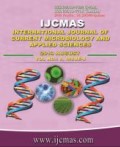


 National Academy of Agricultural Sciences (NAAS)
National Academy of Agricultural Sciences (NAAS)

|
PRINT ISSN : 2319-7692
Online ISSN : 2319-7706 Issues : 12 per year Publisher : Excellent Publishers Email : editorijcmas@gmail.com / submit@ijcmas.com Editor-in-chief: Dr.M.Prakash Index Copernicus ICV 2018: 95.39 NAAS RATING 2020: 5.38 |
There is need of improved and innovative technology to raise production and productivity for enhancing efficiency of agriculture in NER. The Tribal Sub-Plan (TSP) is a strategy for Socio-economic development and livelihood security of tribal people of Meghalaya. The study was conducted to assess the socio-economic status of the respondents and to analyze the tangible and intangible benefits of the interventions in Rongram block of West Garo Hills distrct of Meghalaya. A total sample of 120 respondents was drawn from the different technological components. Simple Random Sampling technique was followed to select the respondents from the sampling frame. The salient findings of the study were about 80 per cent of the respondents belong to marginal and small farmers category of which marginal farmers occupies 50 per cent, which is also an indicator of poverty in the region. Majority of the respondent (75%) depends only in farming in terms of livelihood generation activity. There is an increase (18.42%) in average annual income of the TSP beneficiaries in the block after the interventions through various agricultural inputs, scientific cultivation practices and imparting capacity building programmes in selected villages of Rongram block, West Garo Hills. The cattle farmers reported that on an average, the cows produced 8 litres of milk everyday during the milking period. The milk was sold at ₹47per litre to Central Dairy Unit (Megha milk), West Garo Hills, Govt. of Meghalaya, which adds an imputed gross return per beneficiary ₹376 per day as a daily income. The average imputed return/ per year by the beneficiary was estimated to be of ₹112800. It was observed that 85 per cent of beneficiaries are lacking of own capital which is followed by poor communication facilities (75 %) as constraints perceived by TSP beneficiaries. The study also recommends for up-scaling their livelihood and income which will act as model farmers of the area. The finding will help policy makers and administrators to find out several institution linkages with various community development programmes for its better implementation in convergence mode.
 |
 |
 |
 |
 |